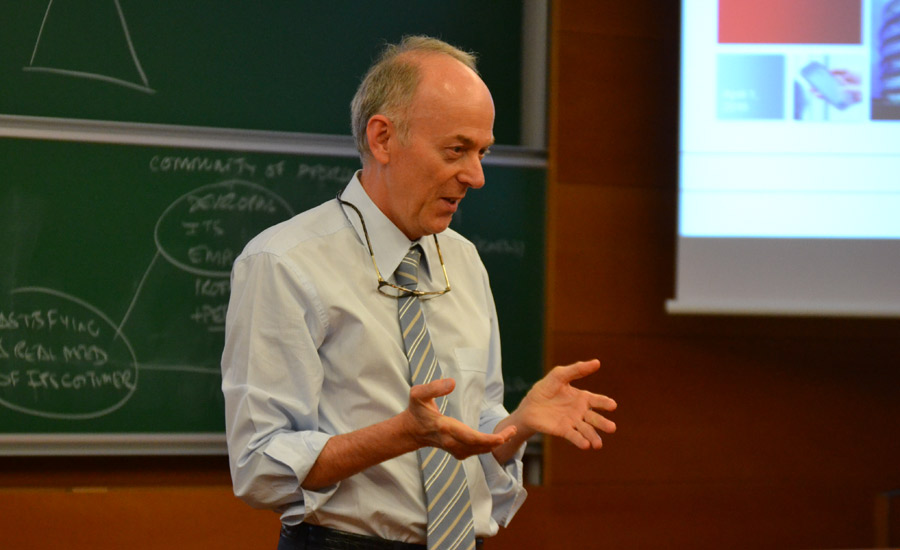
“We’ve seen that while family strategy can change over time, the long-term perspective remains the same,” says Jan Frey, (MBA ’83).
Frey – a fifth generation member of the Henkel family – was one of the keynote speakers at the Family Business Conference, organized by IESE’s MBA Family Business Club and Career Services. He sits on the shareholder, personnel and family committees at the German multi-national, a market leader across the sectors of homecare, beauty care and adhesive technologies. And a family business.
Growing a small German family business to a multi-billion dollar, multinational business with a stronghold in three markets is the product of a “certain amount of flexibility,” says Frey.
In 1990, Henkel appointed its first external CEO. And again in 2009, an external chairperson was appointed to the shareholder committee and supervisory board – again disrupting four generations of family leadership and governance.
“You can’t have someone leading the company just because they’re family,” says Frey. “So we decided to try something different.”
This change of strategy has led to exponential growth and the expansion into new markets. It has also freed the family to focus on safeguarding the company’s values, mission and long-term vision.
Long-term Vision – From a Distance
The Henkel family now holds key roles in governance through the shareholder and supervisory boards. Being a family member, however, doesn’t automatically qualify individuals for membership.
To do so requires meeting strict criteria: intelligence, behavior and moral values are all considered to secure the long-term vision of the company.
“Short-term has never been our primary interest,” says Frey. The family still holds the majority of the company shares, but they are not permitted to sell them. “They are protected to ensure the long-term survival of the company.”
The Henkels have also taken a focus on “family governance” to instill values in the younger generations – with the ultimate goal of maintaining them in the company too.
“We have clubs which organize activities to ensure that the next generation learn about the company – and the family – from an early age,” says Frey. It’s essential that we “focus on the long-term vision and mission – and pass it on to the next generation.”
“This sense of legacy differentiates family businesses from others,” says IESE’s Family Business Chair and Strategic Management Professor, Josep Tàpies during the session. For Tàpies, family businesses are the “backbone” of the world’s economy.
“It’s their long-term vision and mission – deploying family governance that lets them do this,” says Tàpies.
Value Creation from Generation to Generation
They are “loyal to the values they stand for,” says Tàpies. And these are: generosity, commitment, humility, service and quality.
Tàpies also tackled the myths surrounding family businesses. “Despite what some people claim, family businesses aren’t all small. And they do last,” says Tàpies.
He used Spain to illustrate his point. Out of the top 2,254 companies with a turnover of over 50 million euros, 1275 are family businesses, of which 14 percent are third generation or more. Only 11 percent of the other companies are over 60.
“How do you maintain a business for over 60 years in today’s competitive market?” asks Tàpies. “It takes long-term vision to cross this gap and keep growing – like that found in Henkel.”
Advice from Frey for any family business looking to “professionalize” the board was to “make a family contract – and get all members to sign it.”
The next family business event at IESE will be the fifth Family-Owned Business Conference, in Barcelona, June 21.